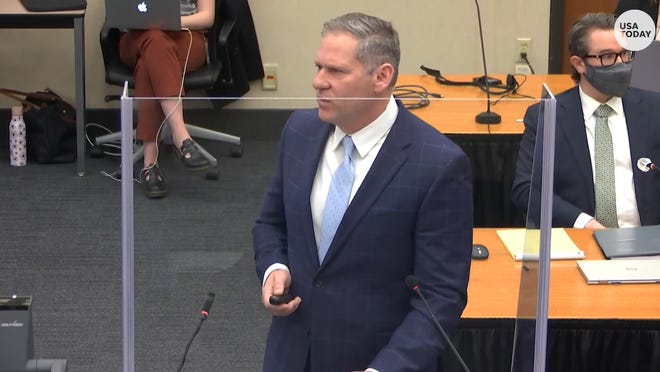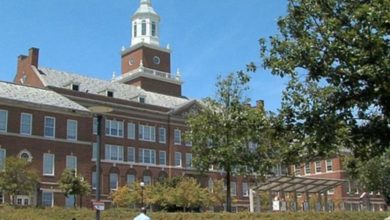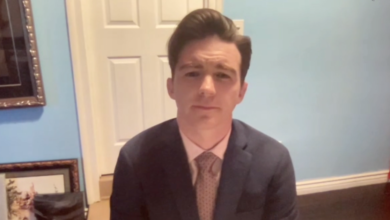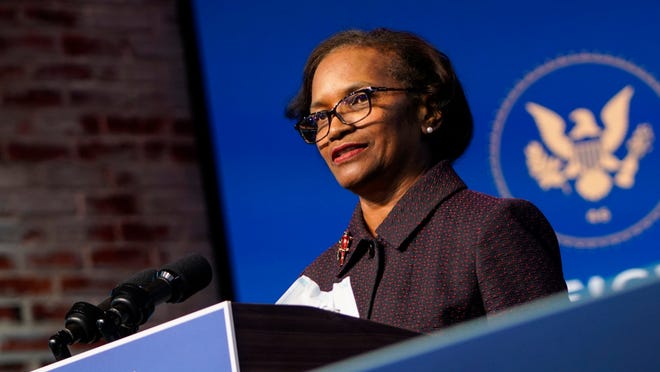
National columnist Suzette Hackney is in Minneapolis for the trial of Derek Chauvin, reporting on the people, the scene and the mood.
MINNEAPOLIS – George Perry Floyd Jr. lived for 17,026 days. But in nine minutes and 29 seconds, that life ceased to exist after a fateful encounter with a now former Minneapolis police officer.
Prosecutors want us to believe Floyd died because Derek Chauvin kneeled on his neck, restricting oxygen flow to his heart and brain. Chauvin's defense attorney contends that Floyd died because he had a bad heart and was high on fentanyl and methamphetamine.
After 44 witnesses over 14 days of testimony, determining the truth is now up to the jury.
During closing arguments Monday, prosecutor Steve Schleicher rightly and methodically humanized Floyd. He talked about his family and childhood. He reminded jurors and all of us watching: Floyd was a human being. He was a 46-year-old man. And but for Chauvin's assault on him, he would likely be alive today.
Daunte Wright killing:Despair is real among Black, brown Americans as police 'mistakes' persist

"George Floyd's final words on May 25, 2020, were: 'Please, I can't breathe.' He asked for help with his very last breath," Schleicher said. "This was a call about a counterfeit $20 bill. All that was required was compassion."
Compassion.
Did Chauvin exhibit even a sliver of it last Memorial Day on the corner of 38th Street and Chicago Avenue?
Did we see compassion when he repeatedly readjusted his body to apply more pressure to Floyd's neck as he screamed out in pain, calling for his mother?
Did we see compassion when onlookers begged for mercy on Floyd's behalf?
Did we see compassion when an off-duty Minneapolis firefighter and trained emergency medical technician stood pleading with Chauvin to allow her to help Floyd?
The answer is unequivocally no.
If there is any upside to the steady loop of video footage that has traumatized us since last May – and particularly since the trial started here last month – it is that we can see and hear the distress of Floyd. We can see and hear the indifference Chauvin displayed as a man lay dying under his knee. We can see and hear the desperation in those who tried to save Floyd's life, but were rendered powerless.
Reopen George Floyd Square?:'Injustice closed these streets; only justice should open them'

Schleicher, stressing that the trial was not an indictment of all law enforcement officers, said Chauvin "betrayed the badge and everything it stood for."
"To be very clear, this case is called the State of Minnesota versus Derek Chauvin," he said. "This case is not called the State of Minnesota versus the police. This is not a prosecution of the police. Policing is a noble profession."
Eric Nelson, Chauvin's defense attorney, rambled on for nearly three hours, attempting to muddy the waters for jurors. He floated scenarios and decisions that "reasonable officers" must make on a daily basis. He blamed an angry mob – seven people – for escalating the situation. He argued that Floyd was a big man who suffered from sudden cardiac arrhythmia due to underlying heart disease. He insisted that Floyd continued to resist while on the ground and handcuffed. He claimed Floyd refused to comply.
An empty chair:Courtroom seat for Derek Chauvin supporters sat nearly empty

Over and over, he argued that any trained, reasonable officer would have done what Chauvin did, even though Minneapolis Police Chief Medaria Arradondo testified that for Chauvin to continue kneeling on Floyd's neck once he was handcuffed and not showing signs of resistance was "in no way, shape or form" department policy or training, "and it is certainly not part of our ethics or our values."
"There is absolutely no evidence that officer Chauvin intentionally, purposefully applied unlawful force," Nelson said.
In my mind, a reasonable officer would have issued a ticket to the person accused of trying to pass a counterfeit $20 bill, which is a misdemeanor. In my mind, Chauvin would have never used such force for such a petty alleged crime. In my mind, if that violent encounter never happened, Floyd would have lived to see his 17,027th day.
"Believe your eyes. What you saw, you saw," Schleicher said.
It's hard not to.
So much is at stake. This case sparked months of protests and unrest for a reason. It prompted important conversations about racial justice and equity, law enforcement reform and a judicial system that might – finally – support the notion of unalienable rights for all people as defined by our Founding Fathers: life, liberty and the pursuit of happiness.
And now America waits.
National columnist Suzette Hackney is a member of USA TODAY’S Editorial Board. Contact her at [email protected] or on Twitter: @suzyscribe










